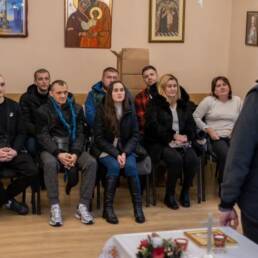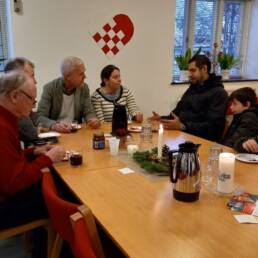Author
Ebru Noistering
Ethics Commissioner and Values Department Manager
Caritas Vienna
The radical act of loving
And hope does not put us to shame, because God’s love has been poured into our hearts through the Holy Spirit that has been given to us.
Romans 5:5, NRSV
Pope Benedict XVI has in his programmatic encyclical Deus Caritas est worked out caritas as a characteristic of the church in its diverse and significant dimensions. “Love Grows Through Love” (Deus Caritas Est, 18); so our love is “never ‘finished’ and complete; it changes in the course of life, matures and remains true to itself” (DCE, 17). Pope Benedict XVI said, that caritas as love will always be necessary, no matter how fair society may be, there will always be people who are in need, who experience suffering, who are alone, who are thirsty and hungry. The burning bush from Exodus 3:2 can be seen as a symbol of this basic human experience of suffering, “There the angel of the Lord appeared to him in a flame of fire out of a bush; he looked, and the bush was blazing, yet it was not consumed.” (Ex 3:2, NRSV) Yet, this experience is known our Creator-God, as we read in the next lines, “Then the Lord said, “I have observed the misery of my people who are in Egypt; I have heard their cry on account of their taskmasters. Indeed, I know their sufferings”. Even in view of the idea that our sorrows will never be consumed, we always can still feel fellowship with Moses and trust in the hopeful biblical reality of Ex 3:14, “God said to Moses, ‘I am who I am.’ He said further, “Thus you shall say to the Israelites, ‘I am has sent me to you.’.”
Caritas is a place of encounter with God. Caritas is an active doing of the gospel, very concretely in encounters with fellow human beings. Caritas is never a one-way street because relationship always happens between an I and a You. When it comes to charity, Pope Francis speaks of expressions of caritas that not only happen in an intimate relationship, but that also have the power to transcend the boundaries of social classes, at a macro level in social, economic, and political contexts. (Fratelli Tutti, 181)
Caritas, with the various dimensions of love and encounter with God as here described, is fundamentally part of the Christian message and must not be understood as preliminary pastoral work. In today’s life caritas is the essence and basic task of a sustainable and living church of the present. It is about justice in society, the profound respect for the whole of creation and the protection of our environment (in the words of Pope Francis), and the role of the church in our time. A church living in the footsteps of Christ has the basic task of empowering people, and supporting them in their mental and physical well-being. Without commitment to this task, justice cannot flourish in society.
Nevertheless, caritas is more than just doing social work and taking care of the needs of people on the fringes of our society. In the words of the great theologian Karl Rahner, SJ, it is the unity of love of God and love of neighbor, and for Pope Benedict XVI. Caritas is a merging of love for God and love for the human being; as we read in the Gospel of Matthew (25:40): “ just as you did it to one of the least of these brothers and sisters of mine, you did it to me.”












